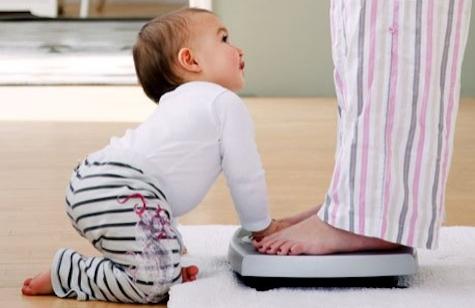Judging by a lot of tabloids and glossy magazines attacks on new celebrity mothers, one could be forgiven for thinking that the primary goal after giving birth is not the health of the baby, but how quickly the mother can "shed the baby weight".
Mothers of the rich and famous kind often don't disappoint in this regard - they whip themselves back into shape in a matter of weeks and unveil post-pregnancy figures that make the average mother scratch her head in disbelief.
Luckily for some women, pregnancy, birth and motherhood are times of readjusting beliefs and expectations about their bodies. Nothing combats the idea that your body is something static than going through the bodily changes of pregnancy and childbirth.
For some women, seeing that their bodies can be the source of life and nourishment - whether they have cellulite or not - is a powerful antidote to the shallow messages encountered in the media. Some of these messages have become so powerful they form part of a mythology about what a new mother's body is "supposed" to look like.
Here are three of these beliefs that might be holding new mums back from truly enjoying the changes your body is going through.
Myth 1: it's only about weight
Your body is not the same as it was when you were 5 years old, or 15 years old. Sure, weight is an obvious indicator of the changes our bodies go through, but it's only one indicator. A woman's body can fluctuate in body fat levels, in the distribution of that fat, in muscle definition, even in the density and arrangement of bones. To focus on just the number on the scale undermines just how profoundly a woman's body can transform during pregnancy, childbirth and beyond.
Most experts believe that it's unreasonable to think you'll reverse all these changes within a few short weeks. Six or even twelve months may be more realistic.
The less-than-glamorous truth is that how quickly you return to "normal" is very dependent on your genes. If your mother quickly returned to her previous weight after birth, you probably will too. And if your family has the kind of genes where 5-7kg is gained with every pregnancy, never to budge again, no amount of diet and exercise will change that.
To merely "get your old body back" is putting it very simplistically. Adjusting after the birth of your child means negotiating your sleep routine, your relationships and your new role as a mother. Your body will experience changes and will never be the same again - for better and worse.
Your life is nowhere near the same now that you have a little person sharing it with you, so why would you expect that your body shows no sign of that?
Myth 2: breastfeeding will fix everything
It's true that breastfeeding your infant will help your hormone levels re-stabilise after birth and assist in helping everything shrink, heal and return to its pre-pregnancy state.
But breastfeeding is not some silver bullet that will effortlessly blast away weight gained during pregnancy. On average, a day's breastfeeding burns around 500 calories. If your diet and activity levels stay more or less the same, this will translate to a gradual weight loss over time. However, remember that breastfeeding is only effective at managing weight if done for more than three months.
Myth 3: Pregnancy is damaging
Perhaps the most common yet unspoken assumption is that pregnancy is something intrinsically damaging to the human body, and that it's our responsibility to mitigate that damage as much as we can. This is, when you think about it, an incredibly sad way of thinking about one of the most miraculous functions of the human body.
Stretch marks, changes in hair, skin and body shape, changes in libido or even complete changes in our world views - these are all part of motherhood and should be embraced. Stretch marks or scars after pregnancy shouldn't be viewed as merely a failure to maintain the appearance of someone who has never given birth. A mother's physique is simply different, and the changes her body experiences are not "damage" any more than the child she gives birth to is "damage".
Negotiating pregnancy, childbirth and motherhood in a culture with extremely narrow ideas of what women should look like can be difficult. It can be hard to resist thoughts that your body after pregnancy is somehow wrong, unwieldy or needs fixing.
Embrace the fact that you don't need to return to your "old body" because you have a body already - and one that has done miraculous things.



















__small.png)










